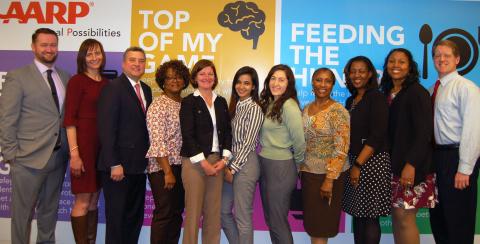Legal value initiatives, while great for all in-house legal departments, often have even greater impact when executed by small legal departments. That was the case for the 14-person legal department in the Office of the General Counsel (OGC) at AARP, which found itself overwhelmed with service requests to review content, images, and video for distribution among multiple channels, even including text messaging. Many internal clients were waiting five days or more for the necessary approvals.
"OGC checks submission language to ensure articles, advertisements, and resources are developed in a non-commercial, nonpartisan manner; and that they adhere to internal policies designed to protect our non-profit tax status and mitigate other legal risk," says Associate General Counsel Doris Gilliam.
Seeking to improve the client experience and reduce wait times by reducing the number of service requests, Gilliam, Client Services Manager Larry Cohen and the OGC State Group, developed and implemented process, technology, and knowledge-sharing changes to automate lower-risk work. By providing client education and standardizing legal guidance, their project resulted in improved predictability and compliance.
The team had already chalked up a proven success with enabling self-service for contracts in 2013, which generated a workload reduction of 25 percent for the Office of the General Counsel (OGC), and a 400 percent increase in contract approval speed for clients. On the proven building blocks of that effort, Gilliam and Cohen with the support of the rest of the OGC team, developed "Train and Trust: Content QuickPath," which was piloted in 2015, launched in 2016, and fully implemented in 2017.
"We wanted to push the boundaries of just how far we could improve our internal service management, improve the overall client knowledge base, and improve client perception based on their experience," says Cohen.
To do that, the legal department offered something novel: a certification internal clients can earn to approve their own content based on clear guidelines. They do this by attending a two-hour, web-based training session with Gilliam; she delivered 11 of these sessions along with a former colleague in the first year, and has now trained 100 percent of the targeted client groups, totaling 243 people. Up to four mandatory quarterly training updates are required for individuals to maintain their certification, in addition to compliance with program guidelines.
"Some of our internal clients were already expert," says Gilliam. "Through training and education, we could confirm that expertise and talk everyone through the guidelines to move others forward."
Guidelines were designed by codifying the business rules the OGC legal team would apply when reviewing content. That step has forced standardization of business rules that can now be applied consistently across the organization, Cohen observes, as well as providing a standardized, predictable, repeatable experience for clients.
The team developed the rules, guidelines, and training program structure collaboratively with the Community, State and National Affairs client group over a year-long period. They baked risk tolerance into the program by establishing categories or tiers of content. Certified individuals may self-approve Tier 1 or Tier 2 content only; OGC prior review and approval is required for Tier 3 content, which is characterized by higher risk profile or complexity. The Tier 3 list is a living document that is continually updated.
Compliance is verified by a monthly audit of various platforms. Certified participants must submit content to a centralized email box for later audit and education. Gilliam also trains service teams, such as the AARP brand department.
The project team measures its success along several metrics, including training sessions delivered, certifications awarded, reduction in OGC service requests, and time savings for clients. Gilliam notes that Cohen has convinced her of the importance of metrics, and that the OGC team "decided to be vulnerable to client service ratings and feedback." In the first full year of implementation, their results were impressive:
- 36.7 percent reduction in service requests
- 90 percent of clients report significant time savings
- 25 percent of clients save a minimum of 1 to 2 business days in process time, while 32 percent reported time savings of more than 5 days
- Clients waited 1,403 fewer business days for content approvals in 2017 than in the year before.
"As our internal clients seek and act upon the opportunities and possibilities for change through innovation, our department must also find ways to function as a change agent. Content QuickPath provides an innovative approach to legal review that enables our clients to experience productivity and efficiency gains, which ultimately increase the impact of our social mission," says David Morales, Interim EVP and General Counsel.
For readers interested in pursuing similar initiatives, Cohen advises doing your homework. "It's critical to do a lot of analysis for these programs before launch to identify categories of work that make sense to convert to self-service," he says.
There have been other benefits for the legal department as well. "By eliminating some of the lower-risk work, our legal department work is now more stable and manageable, and the client experience has improved," Gilliam says. "Our team members have been able to work with internal business units to pursue new ideas and new initiatives that really help to move our mission forward."
